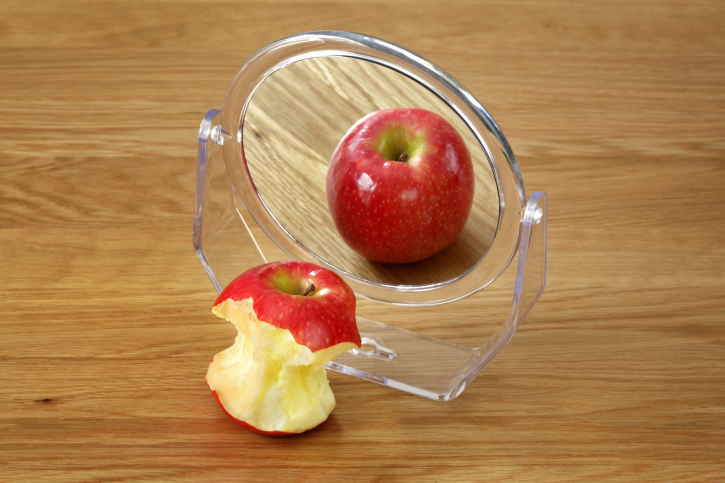 Editor’s note: The subject matter in this article may be triggering for those who experience body image issues, those coping with an eating disorder, and those who are in recovery.
Editor’s note: The subject matter in this article may be triggering for those who experience body image issues, those coping with an eating disorder, and those who are in recovery.
The internet can be a valuable resource for those seeking education and support for anorexia and bulimia. While it may be a helpful tool for recovery and treatment, there is also a wealth of information online that encourages and supports those with eating disorders who are not seeking recovery, but are instead seeking “thinspiration.”
Thinspiration, also referred to as thinspo, is a play on words used to describe the widespread use of photos of thin models and actresses with captions that glorify eating disorders. These memes are shared with the intention of inspiring people to get thin by engaging in disordered eating habits.
Thinspiration or pro-ana/pro-mia (pro-anorexia, pro-bulimia) blogs are popular among those affected by eating disorders, but this is not a new phenomenon. As far back as 2001, Yahoo removed some 100 websites labeled as pro-ana for violating their policies.
In recent years, social media has provided a breeding ground for bourgeoning thinspiration groups, making it all the more challenging to monitor and remove content. According to Eating Disorders Review, a residential treatment center in Chicago reported 30-50% of its teen patients were using social media to support their eating disorders. This has left many therapists, counselors, and others in the recovery community wondering how dangerous they are and what can be done to protect vulnerable teens.
What Is Thinspiration?
Thinspiration is far more complex than the photos of excessively skinny people posted on social media. The pro-ana/pro-mia community views anorexia and bulimia as lifestyle choices rather than mental health conditions. In their quest to support each other in being thin, they provide tips on how to suppress hunger, hide missed periods, and keep stomach acid from affecting the teeth after vomiting.One popular thinspo blog distinguishes “anorexics” from “rexies,” stating, “If you identify yourself as anorexic, then this site is not for you.” The blogger goes on to say anorexics want sympathy for their disease whereas rexies are proud of their accomplishments and seek admiration for their lifestyle choice.
“Nothing tastes as good as skinny feels” is perhaps the most popular mantra of the thinspiration community. Some other popular mottos include “Your stomach isn’t grumbling; it’s applauding,” “I beat obesity,” and the misguided use of Bon Iver’s lyric “Come on skinny love, just last the year.”
They’re not just posting pictures of celebrities, either. Teenagers are posting photos of themselves on blogs and social media platforms, showcasing the different phases of anorexia and bulimia. Often, the highly esteemed photos are of people in the late stages of illness who are hollow-cheeked and gaunt. The “likes” and “thumbs-up” received on social media can give the person positive reinforcement for disordered eating.
Why Thinspiration Is Dangerous
“Thinspo is incredibly dangerous and triggering, especially for those who already have a negative body image,” said Chapin Faulconer, LPC. “I find that my adolescent female clients with eating disorders often look at thinspo and aspire to look like the images they see online. Thinspo not only perpetuates the idea that eating disorders and extreme thinness are acceptable, but it goes one step further and promotes the belief that eating disorders are lifestyle choices and not mental disorders which can result in death, particularly in the case of anorexia.”
Thinspiration websites are especially dangerous for those struggling with disordered eating, particularly adolescents and teenagers. These people are already experiencing self-esteem issues and typically feel isolated from their friends and family. They may turn to the thinspiration community for support and a sense of belonging. While others are telling them they’re sick and need to seek treatment, thinspiration validates their experience and tells them they’re making a lifestyle choice that takes self-control, willpower, and dedication.
Researchers and mental health experts recognize thinspiration as a serious social problem. For the millions of people with anorexia and bulimia, thinspiration can be life-threatening.The pro-ana/pro-mia community has become akin to a sorority for many young girls, who may enjoy the feeling of being involved in a secret society. Some of them even refer to themselves as “the elite” and use mottos such as “girl power” to encourage one another. Even though the community is heavily geared toward females, males are also susceptible to disordered eating. Statistics show about 10% to 15% of people with anorexia or bulimia are male, and they may be less likely to seek treatment because of the incorrect perception that eating disorders only affect females.
One of the websites went as far as to create a pro-ana religion, creed, and psalm, providing readers with a set of rules referred to as “The Thin Commandments.” Some of the edicts included: “Being thin is more important than being healthy,” “Thou shall not eat fattening food without punishing oneself afterwards,” and “Being thin and not eating are signs of true willpower and success.”
Researchers and mental health experts recognize thinspiration as a serious social problem. For the millions of people with anorexia and bulimia, thinspiration can be life-threatening.
Eating disorders have the highest mortality rate of any mental health condition. More than 20% of people diagnosed with anorexia will die from complications related to the condition. The other 80% may experience a variety of health problems as a result of their disordered eating including shrinkage of the heart muscle, irregular heartbeat, muscle atrophy, kidney stones, kidney failure, and osteoporosis.
In addition to the physical effects, anorexia and bulimia can negatively impact a person’s home, personal, social, and professional life. The emotional effects can lead to other mental health conditions. Nearly 50% of people with eating disorders meet the criteria for a depression diagnosis.
How Can We Help?
The National Eating Disorder Association has worked with social media platforms to take this content down. Tumblr, Pinterest, Instagram, and other social media platforms have implemented policies to help prevent the sharing of thinspo-related images and blogs. Popular thinspiration hashtags have been blocked from search features, but many users have figured out ways to get around the ban.
Because censorship seems to be ineffective, studies suggest a zero tolerance policy may not be the best approach. After studying 33 pro-anorexia bloggers, researchers from Indiana University concluded these communities had originally intended to provide support and could be prolonging lives until people with eating disorders were ready to seek recovery. James Watson, administrator of PrettyThin, formerly the world’s largest community for individuals with eating disorders until it shut down in 2014, saw the community as a safe haven for individuals to talk openly about their issues.
The problem isn’t unique to eating disorders. Information and websites promoting other forms of self-harm also exist, including pro-cutting websites, pro-suicide websites, and sites that support drug abuse. According to researchers, when zero tolerance doesn’t work, harm reduction may be a better strategy.
Furthermore, if these websites are providing a sense of community for people, what may be needed are more alternative communities that promote a healthy self-image and relationship to one’s body while still providing a safe space for people to openly express their concerns without feeling judged or labeled.
According to a report by Common Sense Media, teenagers spend an average of nine hours a day consuming some type of media. Studies show more media exposure is directly linked to a higher risk of mental health issues and lower self-esteem.
Perhaps these are the most important questions: What messages are sent out to people about body image and self-acceptance, and how do we shift those messages so media exposure can increase self-esteem rather than deplete it?
Where to Seek Support for Disordered Eating
If you or someone you know is struggling with an eating disorder, it may be beneficial to seek the guidance of a mental health professional. The following resources may also be of help.
National Eating Disorders (NEDA)
Helpline: 1-800-931-2237
Website: www.nationaleatingdisorders.org
National Association of Anorexia Nervosa and Associated Disorders (ANAD)
Helpline: 630-577-1330
Website: www.anad.org
Support Groups by State: http://www.anad.org/eating-disorders-get-help/eating-disorders-support-groups/
Eating Disorder Hope
Helpline: 1-888-206-1175
Website: www.eatingdisorderhope.com
References:
- Eating Disorders Fact Sheet. Eating Disorder Coalition. Retrieved from http://www.eatingdisorderscoalition.org/inner_template/facts_and_info/facts-about-eating-disorders.html
- Eating Disorder Statistics. Retrieved from http://www.anad.org/get-information/about-eating-disorders/eating-disorders-statistics/
- Grayson-Mathis, C.E. (2005). Pro-anorexia websites: The thin web line. Are these sites fueling an epidemic? Retrieved from http://www.webmd.com/mental-health/eating-disorders/anorexia-nervosa/features/pro-anorexia-web-sites-thin-web-line
- Greenfield, R. (2012, April 21). To ban or not to ban? How do you solve the problem of thinspo? The Wire. Retrieved from http://www.thewire.com/technology/2012/08/ban-or-not-ban-how-do-you-solve-problem-thinspo/51436/
- Gregoire, C. (2012, February 9). The hunger blogs: A secret world of teenage thinspiration. Huffington Post. Retrieved from http://www.huffingtonpost.com/2012/02/08/thinspiration-blogs_n_1264459.html
- IU researchers interview pro-anorexic bloggers for groundbreaking new study. (2012, August 20). IU News Room. Retrieved from http://newsinfo.iu.edu/news/page/normal/22967.html
- Totally in control: The rise of pro-ana/pro-mia websites. Social Issues Research Centre (SIRC). Retrieved from http://www.sirc.org/articles/totally_in_control2.shtml
- Wallace, K. (2015, November 3). Teens spend a ‘mind-boggling’ 9 hours a day using media, report says. Retrieved from http://www.cnn.com/2015/11/03/health/teens-tweens-media-screen-use-report/
- Wilson, J. & Hernando, H. (2015, February 28). ‘Thinspiration selfies almost killed me’: Anorexia survivor’s warning as Mirror investigation uncovers shocking secret world on Instagram. Retrieved from http://www.mirror.co.uk/news/real-life-stories/thinspiration-selfies-killed-me-anorexia-5245488

The preceding article was solely written by the author named above. Any views and opinions expressed are not necessarily shared by GoodTherapy.org. Questions or concerns about the preceding article can be directed to the author or posted as a comment below.

 Self-Compassion for Shame and Eating Disorder Recovery
Self-Compassion for Shame and Eating Disorder Recovery The Complex Picture of Later-Life Eating Disorders
The Complex Picture of Later-Life Eating Disorders Orthorexia: An Obsessive Relationship with Healthy Eating
Orthorexia: An Obsessive Relationship with Healthy Eating

Please fill out all required fields to submit your message.
Invalid Email Address.
Please confirm that you are human.
Leave a Comment
By commenting you acknowledge acceptance of GoodTherapy.org's Terms and Conditions of Use.